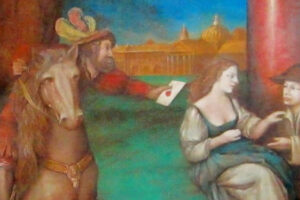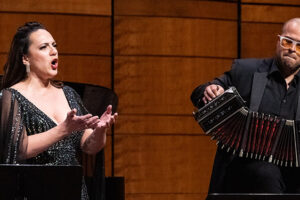
It is hard to know just who is the intended audience for this release
of Pelléas and Mélisande. The “Opera in English” series on Chandos has issued commercial releases of live broadcasts by important artists in roles they never recorded in the studio (Elisabeth Soederstroem as Christine in Intermezzo, Janet Baker as Charlotte in Werther, etc.) But what is the justification here?
With the exception of Sarah Walker and John Tomlinson, none of the principal singers has much name recognition outside ofEngland. Its primary distinction is also its greatest liability: an English-language rendering of what for many is an opera unthinkable in anything other than its original French.
Hugh Macdonald’s translation is problematic on several levels. In the liner notes, he states: “Being prose, the text has neither rhyme nor metre, and the vocal writing is close to speech. A translation must therefore aim to reproduce the conversational, unpoetic, essentially plain tone of the original even if a different number of syllables is often required in English in comparison with the same line in French.” The shift in syllables is jarring and always sounds at odds with Debussy’s rhythmic treatment of the vocal line. One hears this early on when Mélisande’s “Ne me touchez pas” is truncated to “Don’t touch me.” The English setting rubs out the breathless, frightened character of her first utterances. There are many similarly unconvincing moments.
The cast is generally efficient but not particularly memorable. As Mélisande, Eilene Hannan occasionally evokes memories of Soederstroem in this music but without the Swedish diva’s radiant expressiveness and gift for detailed portraiture. Robert Dean (no relation to the American Wagnerian tenor) is earnest and inoffensive but conveys little of the haunted desperation associated with the very greatest interpreters of Pelléas. Neil Howlett’s attractively vocalized Golaud is all smoking jacket and brandy snifter, completely missing the note of savagery in the later scenes.
Walker’s ripe, pungent mezzo-soprano is heard to striking effect in Genevieve’s brief scenes. Even more impressive is the young Tomlinson as Arkel. The voice is surprisingly lighter in timbre and weight than what audiences would encounter later via his weathered readings of Wotan, Hans Sachs and Gurnemanz. His singing gives consistent pleasure and he brings much-needed presence and personality to the performance. As Yniold, Rosanne Brackenridge does better than most adult singers in simulating the uncomplicated sound of a boy soprano but I still prefer a child performer.
Mark Elder leads the English National Opera and Chorus and he is the performance’s greatest asset. He finds wondrous degrees of luminosity and transparency in the lyrical portions of the score but is unafraid to let a Wagnerian roar surface from time to time, as in the interlude between the two scenes of Act Four. Elder brings unabashed passion and sexual release to the penultimate scene between Pelléas and Mélisande.
Curiously, there are little snips in several of the interludes for no apparent reason. The recording is spread across three discs, so the cuts were unique to the production and the rationale for them is now presumably lost to obscurity. The sound is exceptional for a broadcast: crisply detailed with a perfectly integrated balance between singers and orchestra. Would that Met broadcasts of the period boasted similar refinement!
In summary, this release may stir warm memories for those who saw this performance at the Coliseum back in 1981. But it is hardly competitive with the very best recordings of the opera and seriously hobbled by its dutiful, drab translation.
























Comments